Archives by Date
May 2003
Possibilities · All art is quite useless · Harbour sunset · Buenos Aires · Gazing at Oneself · Love · Rainbow over "Devil's Throat" · Reckless ·
Possibilities · All art is quite useless · Harbour sunset · Buenos Aires · Gazing at Oneself · Love · Rainbow over "Devil's Throat" · Reckless ·
May 26, 2003 |
Possibilities
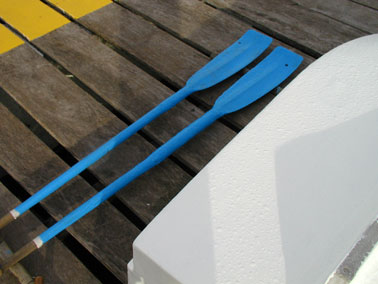
A very small boat, named Possibilities, is docked by our side. It carries a man and a woman, across the Atlantic just now, and around the world. The man is painting his dingy white, his oars blue, with a white band on the handle. The woman, with brows arched as beautifully as the sail and a face that would light up the cabin, invites us to dinner. They must like each other very much.
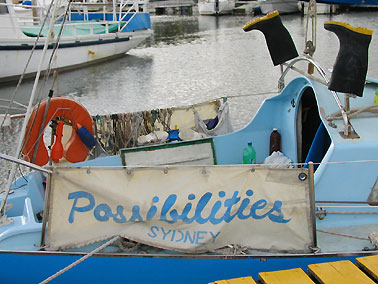
Posted by yingzhao 03:59 PM | Permalink
May 25, 2003 |
All art is quite useless
I usually don't like to put a lot of quotations on my site, as they are so widely available on the web, a stuffing of sorts. But recently Oscar Wilde has become a influence, not so much discovered as detected, as he would say. These well-quoted lines of its preface still astonished me.The Picture of Dorian Gray by Oscar Wilde
-
The artist is the creator of beautiful things.
-
To reveal art and conceal the artist is art’s aim.
-
The highest as the lowest form of criticism is a mode of autobiography.
-
Those who find beautiful meanings in beautiful things are the cultivated. For these there is hope.
-
There is no such thing as a moral or an immoral book. Books are well written, or badly written. That is all.
-
The nineteenth-century dislike of romanticism is the rage of Caliban not seeing his own face in a glass.
-
No artist has ethical sympathies. An ethical sympathy in an artist is an unpardonable mannerism of style.
-
No artist is ever morbid. The artist can express everything.
-
Vice and virtue are to the artist materials for an art.
-
All art is at once surface and symbol.
-
Those who read the symbol do so at their peril.
-
Diversity of opinion about a work of art shows that the work is new, complex, and vital.
-
When critics disagree the artist is in accord with himself.
-
All art is quite useless.
Posted by yingzhao 11:47 PM | Permalink

Sunset in Mar del Plata, Chilean flag on our mast.
Posted by yingzhao 04:10 PM | Permalink
May 20, 2003 |
Buenos Aires
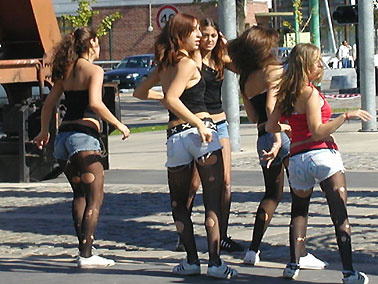
"¡Me gusta como bailas!"
» y me encanta Buenos Aires «
Posted by yingzhao 04:07 PM | Permalink
May 19, 2003 |
Gazing at Oneself
A friend of mine enthuses about the Mirror Project, a web collection of self-portraits in reflective surfaces, submitted from around the world. Yes, it's very interesting. It has loyalty of the web in-crowd as many who have some online "presence" link to their self-portraits there; it's got popular appeal too as its press shows, such as an article in "O," the Oprah Magazine. Its popularity is understandable: which new digital camera owner hasn't turned the lens on herself for the immediate gratification? While playing with the new toy, everyone discovers it's now much easier to take pictures of yourself: tripod no longer necessary, just stand in front of a mirror or reflective surface and use the LCD screen to compose. With millions of such pictures out there, contributors and audience being the same group with easy access to read/write... 15,000 pictures in a database isn't such a wonder. It's an example of infrastructure facilitating content.I'm neutral about its content vs. noise ratio: I don't click through it endlessly for the interesting images the same way I have no desire to surf the channels for something I can watch. Though I never stay very long as so many photos are boring beyond salvation, I've enjoyed some of them, interesting or beautiful or otherwise able to sustain attention, in the sense of internet time. The site does a good job of highlighting these, and I certainly appreciate the efforts of those who created it, in their spare time, with no reward other than internet noteriety. As a project it's very interesting. What it means however, irks me. It's not very fashionable to talk about meaning on the web, but when something bothers me, which doesn't happen often, it's sometimes a sign for something worth digging. So here it goes.
During my mother's long years of living alone, there was a time when she took pictures of herself. Not a visually creative person, they were taken with a simple point-and-shoot on a tripod, a white wall as backdrop. Once in a while she took these pictures, at a glance all looking the same, over and over. When I saw them I was saddened by a realization: without the reflection of herself in the eyes and expressions of someone close to her, these pictures were necessary in some way, a confirmation of her existence. The face in the mirror is fleeting, ghost-like, but a photo, paper or pixels, is proof.
The base desire for the self-image is recognition, that "I" exist. We are all fascinated by our own images, vanity and narcissicism aside. There is a much deeper need answered by such an image. It's a confirmation of the symbolic self in existence in addition to the physical entity, in other words, a soul. We see our own face, our own eyes, in the image, and recognize ourselves: our eyes meet the self, at some point outside of the physical world, a place spaceless and timeless.
My mother's self-portraits told me that taking them is an act of aloneness. This is not the same as loneliness, though for many the difference is undistinguishable. It's more than solitude however, not only is there no existence of a real "other," there is a self-contained or self-absorbed quality. If solitude and lonliness are two ends of a spectrum of aloneness, this is somewhere the middle. Many of those taking images of ourselves with digital cameras are frequently alone, frequently gazing only at themselves.
There are other impulses behind self-portraits. Technology is explicitness. What's captured, transmited, broadcast, becomes more important, by its very existence. The web has been a prime example of it: if it's not on the web, it must not be very important. Students do most of their legwork on the web these days, increasingly reluctant to walk through library stacks or seek out information in the mind of others. For the multitudes spending much of their time, freetime, in front of the the computer, their image in this "collection," gains an extra level of importance, other factors excluded.
To go one step further, it's not only an act of aloneness, it also perpetuates aloneness. The importance, or self-importance, that technology ascribes means that real social interaction lose symbolic value and becomes less and less necessary. The more technology perpetuates our lives, the lonelier, in general, we seem to get. With technology we are more sufficient onto ourselves, able to satisfy even the most emotional and existential needs, such as your reflection in someone's pupils. I would not be surprised if there are such images in the database, but the reasons for posting it would be "look what I can do with this micro-lens" rather than the intimacy between the ones gazing into each other's eyes.
To take another turn, technology has become so pervasive in the world that you and I inhabit, that the artifacts are losing their meaning. Many have written about the casualness which we make the transitions between the real and virtual worlds, the oversaturation of things competing for meaning, the numbness in which we navigate the world so as to guard ourselves against noise, the un-awakened state of our mind. Perhaps as a reflex in such waking sleep, we snap an image and say, ah, here I am. I'm less lost than I thought.
I like the Mirror Project because it's participatory, a good example of some of the strengths of the internet. I'm neutral about the quality of its content and the filtering of its noise. I hate it because it shows, in so many words multiplied by an ever-growing database, that technology can make us feel so alone.
__________________________________________
Notes:
· I read a few months ago an excellent essay, The Tribal Terror of Self-Awareness by Edmund Carpenter, some ideas of which are echoed here. It is included in Principles of Visual Anthropology. Paul Hockings, Editor. Mouton de Gruyer, second Ed.
· We all live in an incredibly visual culture, only becoming more overwhelming with time. To take a trip through it with a writer who has a sharp eye, a disciplined voice, and a humanist care for the social and the soulful, check out Rick Poynor's essays and book: Obey the Giant: Life in the Image World.
· The ways that technology changes us is irreversable, but with typical human ingenuity, we use it in rich ways and change the path of its development. The camera, and today the digital still and video cameras, undoubtedly bring us closer in amazing ways. Technology extends our reach, but its touch is not one of depth. This is its nature. I suggest no ways to reverse the trend, as technology, for all it has promised, has never suggested that it would serve up the meaning of life on a platter.
Posted by yingzhao 09:29 PM | Permalink
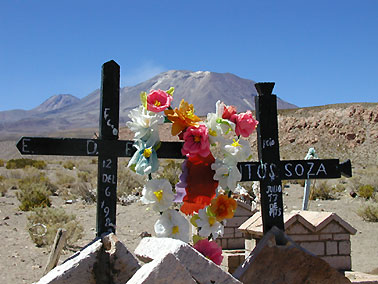
Posted by yingzhao 07:43 PM | Permalink
May 16, 2003 |
Rainbow over "Devil's Throat"
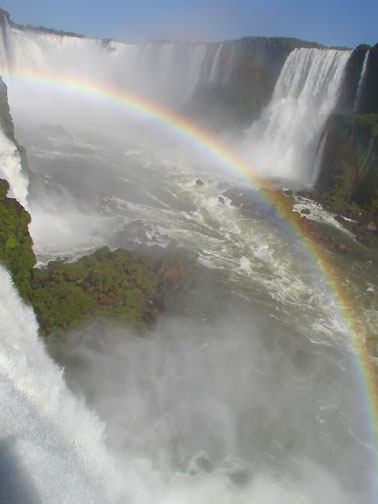
» Click here for more images of the lush and powerful Iguassu Falls «
Posted by yingzhao 04:16 PM | Permalink
May 13, 2003 |
Reckless
I am in BRASIL, not originally in my travel plans but the mere sound of its name hums with music and passion, so I'm here. São Paulo doesn't have a good reputation with travelers generally, but so far I'm impressed: since San Francisco I have not seen a people so multicultural, fabulously beautiful, or as anything goes. Yesterday on a bus journey across the city, there was a young hockey player among the cars, weaving across the traffic on his inline skates, holding on to cars and busses for a ride, chatting to the drivers and fixing their mirrors at stoplights, cruising and sliding to the side to catch the next ride, skating as fast as he can while cars caught up with him and honked from behind. He was going as fast as any of the cars, sharing the space of machines with ease, obviously having done this frequently. As in most of the world, the cars fill all available space on the roads with no regard for lanes, and he was wearing hockey gear but no helmet. I think the entire bus watched him for half the city and silently rooted for young daredevil.My heart has taken a hit these couple of days, thus I've gained a special affinity for acts that are courageous or reckless. More importantly the latter, as all matters that make the heart leap necessarily are.
Posted by yingzhao 10:30 AM | Permalink